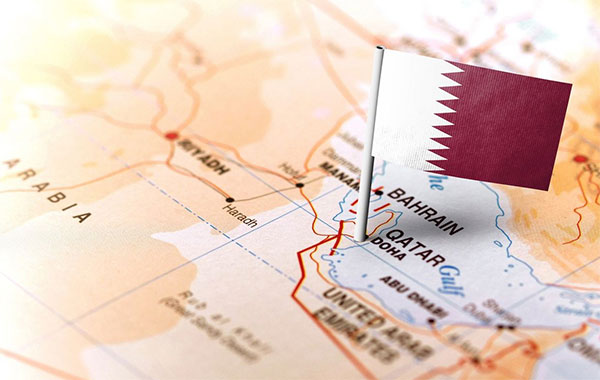It is more than three years since the Qatar crisis began, and it does not look like it is going to end anytime soon. While the Saudi Arabia and the UAE launched the economic blockade of Qatar two years ago, they were expecting it to be effective within a short time. More than 60 percent of Qatar's trade was enroute the UAE ports and Saudi border, the blockading countries felt that the isolation would lead to a painful disruption to Qatari economy. When this was coupled with the support of US President Donald J. Trump, it was thought that Qatar would be compelled into accepting the Saudi demand to alter its 'unacceptable' foreign policy. However, none of these predictions actually materialized.

International Reactions to the blockade
Iran and Turkey came forward to support Qatar, as soon as the blockade was announced, by offering to establish fresh trade ties and delivering several consumer goods by ships and planes. While the airspaces of UAE, Saudi Arabia, Bahrain and Egypt were blocked, Iran opened its airspace to commercial planes for flights to Qatar.
Although the US President Donald Trump initially expressed support for the blockade, later it was clear that the US official reaction was actually neutral. However, Qatar continued to remain defiant, and was further emboldened by the Turkish military support. Prior to the blockade, Turkey maintained some small troops in Qatar as a symbolic gesture of military cooperation. Later, upon request by Qatar, Turkey raised its troops to 3000 following the blockade.
Efforts by Qatari government
Apart from these external factors, the small population of Qatar and its large sovereign wealth also contributed towards Qatar’s ability to maintain its defiant state, and resist the blockade.
The government in Qatar used its solid financial reserves to pay for higher transportation costs of imports and to support the domestic industries that suffered huge losses due to the blockade. The Qatari government also strengthened its stand to attract foreign investments and prevent the existing businesses in Qatar from leaving the country.
The government also prioritized financing for major construction projects that were underway for the 2022 World Cup. Several international firms that were managing their businesses in Qatar with their regional offices in Dubai, actually bypassed the blockade and established direct branches in Qatar.
The economic impact of the blockade
As per economic statistics the negative impact of the blockade on investment and economic sector as moderate in 2017 and 2018. The annual economic growth was positive, but fell from 2.1 percent in 2016, to 1.58 in 2017, and an estimated 2.2 percent in 2018. On the other hand, Saudi Arabia and the UAE experienced -0.7 percent and 0.7 percent annual economic growth rates in 2017. Moreover, despite the temporary scarcity of several goods, the blockade did not lead to any major price increase, and the annual inflation rate in 2017 was less than one percent.
Consequences of the blockade on GCC
The Qatar blockade had its share of major regional consequences, with the six-member GCC practically getting paralyzed. The GCC was already suffering from internal divisions and factionalism. GCC countries took several steps towards security and economic cooperation. It was also successful as a regional block in several rounds of investment and trade negotiations with China, Europe and India from 2000 to 2010.
The GCC members were able to manage the internal rivalries and disagreements until the Qatari crisis, so as to maintain minimum display of unity, including incidents like the Saudi-Bahrain dispute in 2005 over free trade agreement with US, and the Saudi-UAE dispute over location of a GCC central bank etc. However, the Qatar crisis led to greater division among the nations that was beyond repair. New alliances and members have also been formed, which may undermine GCC. The Saudi Arabia and the UAE announced formation of new bilateral military and economic alliance, which is partly the result of their close ties in the Yemen war and other regional issues.
Striking the balance
On the other side of the dispute, Qatar has been able to strengthen economic ties with Turkey and Iran. The Turkish construction firms have won several contracts for World Cup projects, which otherwise would have been awarded to the UAE-based construction giants such as Emaar. Several other Iranian businesses have also come under pressure in Dubai due to the Iran-UAE tensions, and they have moved their operations to Doha.
Meanwhile the US offers military protection to every GCC country, not against external powers like Iran or Iraq, but against each other. Therefore, a small nation like Qatar can depend on US protection to pursue an independent foreign policy without paying attention to larger GCC neighbours. As long as the US does not pressurize Qatar for a compromise, Saudi and UAE cannot compel Qatar to give in, and the crisis will continue. At the same time, the heavy US military presence in the region prevents either side from escalating the crisis into a military confrontation
Crisis to continue?
As various attempts by intermediaries have failed to end the Qatar crisis, the international community is now viewing this as new normal for dealing with GCC countries. There has hardly been any change in Qatar's foreign policy and it is competing with Saudi Arabia and the UAE for influence in the Arab world and beyond. Both sides are currently trying to improve their relationship with Iraq. Qatar has also expressed interest to court the Shia factions that are close to Iran.
In fact, when looking back, the blockading nations have not achieved much in the past two years. Despite their high-profile campaigns against Qatar, they have not succeeded much in generating an international political or diplomatic narrative against the regime in Doha. Also, with their obtuse stand against Doha, they have unknowingly strengthened the position of Iran and Turkey, who are now the new big players in the ongoing Middle East game.